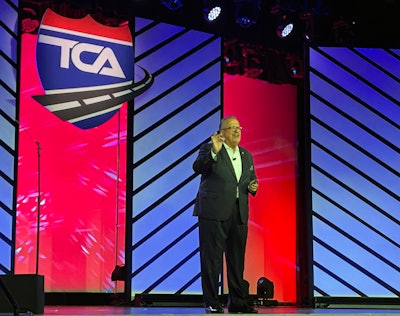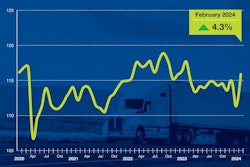
A freight trough that has plagued trucking since emerging from the COVID-19 pandemic is temporary, and recovery will be spurred by the largest housing, construction and consuming market in U.S. history, said author, demographer and generational marketer Ken Gronbach in his delivery of the keynote address Monday morning at the Truckload Carriers Association annual convention in Nashville.
There are currently 170 million people under the age of 40 in the U.S.
"This is a record for our country," Gronbach said, adding that trucking is a business of moving stuff, and the need to move stuff "is coming your way, and you better prepare for it."
Generation X is 9 million people smaller than the Baby Boomer generation, pulling a tide of would-be workers and consumers out of the pool and helping cripple the housing market and the automotive market in the early 2000s. As those 170 million mature and participate in the economy, "what is going to happen to the United States is unprecedented," Gronbach said.
"The bad news is, you have to change," Gronbach added, noting that legacy business practices are unlikey to win over a consumer base that makes decisions based on three key factors: "Make my life easy. Save me some time. Don't rip me off."
Staring down the barrel of a hotly and, at times ugly, presidential election cycle, Gronbach said math suggests liberals will win the political wrestling matches in the immediate future simply because there are more of them by several million, adding that people generally move from liberal to conservative as they age.
"We're losing a conservative every eight seconds," he said, "and we're gaining a liberal every eight seconds."
Not only is the population base skewing younger, its racial and cultural makeup is shifting.
The generational population gap between Baby Boomers and Generation X was filled by Latinos, and Latinos are currently driving the U.S. labor force, Gronbach said, adding caucasians are now a minority in the U.S., and the level of immigration into the U.S. is as high as it was in the early 1900s.
As ethnic and cultural diversity change the makeup of the transportation workforce, Gronbach noted there is a sizable pool of labor that often gets overlooked: convicted felons, which make up one-third of the 60 million men between the ages of 25 and 55.
"You want to solve your driving problem, figure this one out," he said, noting that Amazon, FedEx and Walmart each hire felons.
The quest to hire younger workers isn't unique to trucking, and it's not a new problem or effort for the industry, but Gronbach said understanding the problem and planning to mitigate it is the only way to avoid disaster.
"You need to know how big your end user market is, and is it getting bigger or smaller; and the size of your talent pool, and is it getting bigger or smaller," he said, adding both are getting bigger in trucking – good news for motor carriers as the average size of a trucking company in the U.S. is seven trucks.
The U.S. also stands to benefit from a falling global population, as it has let men and women work out re-population themselves.
"If you don't understand aging, you're going to be like Japan and China that has only old people," he said. By 2100, India will be the most populous country in the world, passing China. The U.S. is insulated from meaningful population decline for upwards of 40 years, at least, Gronbach said, although he noted employees should "get used to working with people in their 70s."
Other countries aren't fairing as well.
"Japan is already finished," Gronbach said. "Their kids, their young people, don't date, they don't marry, and they don't have kids," he said, adding that "Russia will disappear," noting high casualties in the Ukraine war and an exodus of citizens.
China is missing half a billion people under 40 years old, Gronbach said.
"Their market economy fails. China will not make it to 2030," he said. "Don't worry about China charging into Taiwan. They're not going to do it. They can't."
The Chinese labor force has declined since 2012, and 90 million young men in China have no prospect of marrying because there's not enough women, both of which are problems created by a one-child per couple policy that was boosted to two children per couple just eight years ago.
The U.S., too, stands to gain in the collapse of Chinese manufacturing, as does Mexico, Gronbach said.
"The Americas will be the center of the Earth," he added. "God bless the Americas. The rise of manufacturing in Mexico will be enormous."
The immigration of Latinos has been a political hot-button for years, but "without Latinos, we don't have a country," Gronbach said, adding that by 2030, one in five of the U.S. labor force will be Latino, and in just a few decades, the groups of people who have made a political football of immigration will be begging Latinos to stay.
"The best days of the United States and the Americas are ahead of us, not behind us."










